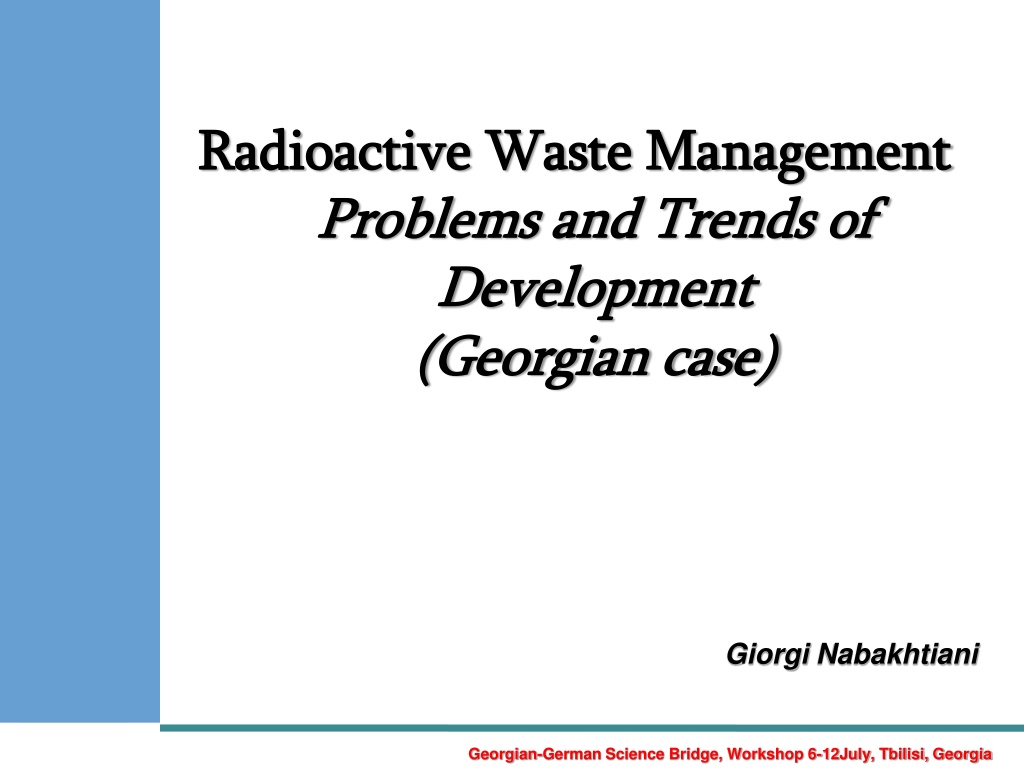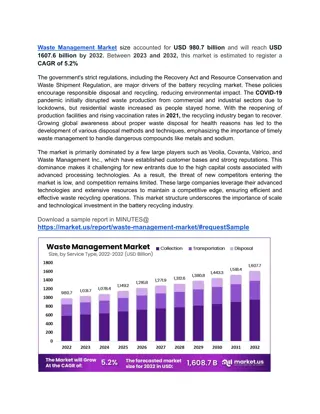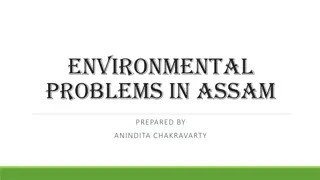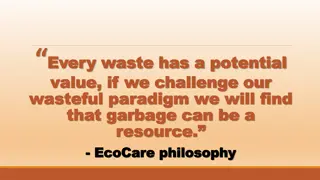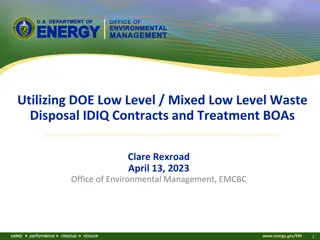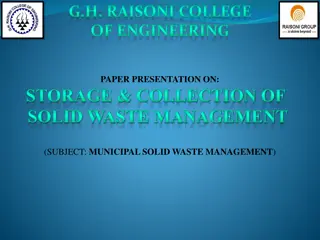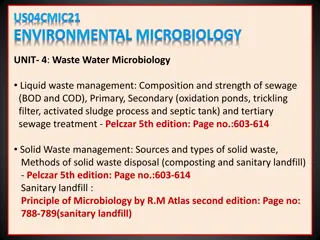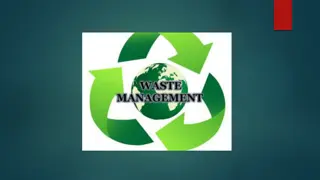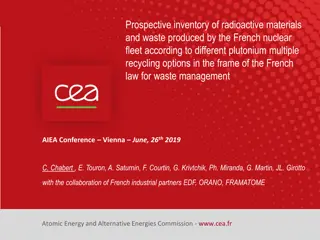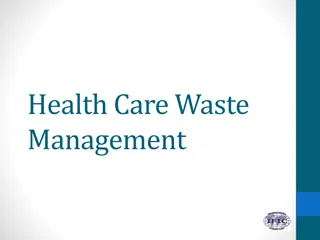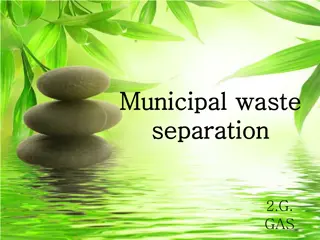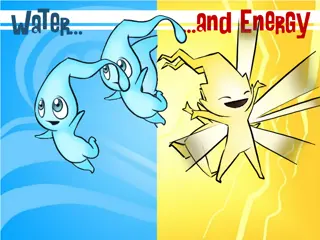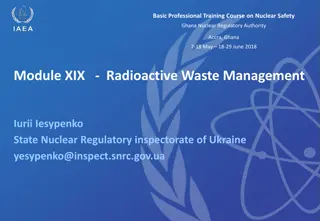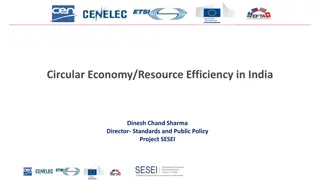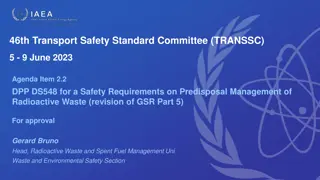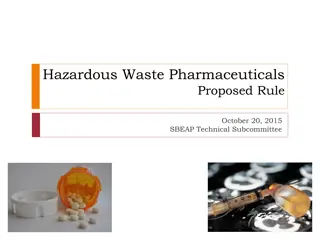Challenges in Radioactive Waste Management: A Case Study of Georgian-German Science Collaboration
This document delves into the management of radioactive waste, highlighting the problems, trends, and development in the Georgian context. It explores the principles set by the IAEA for waste management, emphasizing the protection of human health, environment, and future generations. The discussion also covers the legal, administrative, and infrastructural aspects of waste management, focusing on the existing reality in Georgia and the necessary steps for improvement.
Download Presentation

Please find below an Image/Link to download the presentation.
The content on the website is provided AS IS for your information and personal use only. It may not be sold, licensed, or shared on other websites without obtaining consent from the author. Download presentation by click this link. If you encounter any issues during the download, it is possible that the publisher has removed the file from their server.
E N D
Presentation Transcript
Radioactive Waste Management Radioactive Waste Management Problems and Trends of Problems and Trends of Development Development (Georgian case) (Georgian case) Giorgi Nabakhtiani Georgian-German Science Bridge, Workshop 6-12July, Tbilisi, Georgia
Introduction (IAEA definitions) Radioactive waste: Radioactive material for which no further use is foreseen Radioactive waste manegement: All administrative and operational activities involved in the handling, pretreatment, treatment, conditioning, transport, storage and disposal of radioactive waste. Georgian-German Science Bridge, Workshop 6-12July, Tbilisi, Georgia
Introduction Georgian-German Science Bridge, Workshop 6-12July, Tbilisi, Georgia
Management Principles 9 basic principles are defined by IAEA (111-F): 1. Protection of human health 2. Protection of the environment 3. Protection beyond the national borders 4. Protection of future generations 5. Burdens of future generations 6. National legal framework 7. Control of radioactive waste generation 8. Radioactive waste generational and management interdependence 9. Safety of facilities Georgian-German Science Bridge, Workshop 6-12July, Tbilisi, Georgia
Waste Management Waste management system should contain: 1. Legal basement Laws and regulations defining main requirements for safe handling with radioactive waste; 2. Administrative structure Governmental institutions (Regulatory body, Radioactive Waste Management Agency and others), which conduct state regulation and handling with radioactive waste; 3. Infrastructure for handling with radioactive waste - Facilities (storage facility, disposal and others) and means, using of what handling with radioactive waste should be conducted; 4. Financial system financial mechanism for handling with radioactive waste Georgian-German Science Bridge, Workshop 6-12July, Tbilisi, Georgia
Waste Management Georgian Reality: 1. Legal Basement Only some requirements are adopted. The whole system should be established 2. Administrative Structures Georgian Ministry of Environment and Natural Resources Protection through its Department for Nuclear and radiation Safety (Georgian Law On Nuclear and Radiation Safety art. 6) acts as a Regulatory body. The main task is establishment of Radioactive Waste Management Agency which on behalf of state should conduct radioactive waste management within whole country. Georgian-German Science Bridge, Workshop 6-12July, Tbilisi, Georgia
Waste Management 3. Infrastructure for handling with radioactive waste CSF is under operation (some addition improving of safety system components is desired). Closed near surface disposal is also existed. Is possible or not to use (and how) the disposal site for further disposing - the answer can be obtained based on the results of G.4.01.09 project It is taken the first step within IAEA project GEO/9/011 to establish simple radioactive waste processing facility at the CSF. 4.Financial system The system is not defined well. Financial support is provided by the state. Georgian-German Science Bridge, Workshop 6-12July, Tbilisi, Georgia
Waste Management - Types of radioactive waste: Legacy waste (Disused Sealed Radioactive Sources), reactor decommissioning waste, NORM, medical waste - Ways for waste generations: 1. Demolition of large facilities (Such as nuclear reactor) 2. Renovation of the disposal site (some radioactive waste probably should be retrieved and reprocessed) 3. Generation of new waste due to developing of industry and medical application of radioactive sources. 4. Generation of secondary radioactive waste Georgian-German Science Bridge, Workshop 6-12July, Tbilisi, Georgia
Waste Management Georgian-German Science Bridge, Workshop 6-12July, Tbilisi, Georgia
Waste Management Whole process for handling with radioactive waste can be divided into three main phases: 1. Establishment of national system for radioactive waste management (elaboration of legal basement, establishment of radioactive waste management agency) 2. Predisposal activity (processing of the waste, preparation of the disposal) 3. Disposing. Georgian-German Science Bridge, Workshop 6-12July, Tbilisi, Georgia
Waste Management During the waste handling the following actions should be considered: a) Openness; b) Involvement of stakeholders; c) A deliberative and accessible process; d) Provision of adequate time for the resolution of issues; e) Final disposal is regarded as the ultimate step in the radioactive waste management process; f) The aim shall be to achieve a maximum degree of passive safety in storage facility and disposal; Georgian-German Science Bridge, Workshop 6-12July, Tbilisi, Georgia
Waste Management h) The following hierarchy of waste management options shall be followed where practicable: h.a) Avoidance and minimization of waste trough: h.b) Re-use, reprocessing and recycling; h.c) Storage; h.d) Conditioning and disposal. i) The national radioactive waste management strategy shall cover the total life cycle of waste management generation to institutional control; j) The competent regulatory body must specify the period for which an active institutional control may be assumed for purposes of safety assessments. Georgian-German Science Bridge, Workshop 6-12July, Tbilisi, Georgia
Waste Management k) The transfer of waste among generators shall be considered provided all issues pertaining to ownership and liability and safety are addressed. l) To minimize the burden on future generations, decommissioning and closure of facilities should be implemented as soon as practicable. m) The deliberate dilution of radioactive waste is not acceptable, however in the case of NORM waste the dilution of higher concentration material with lower concentration material will be considered provided all relevant regulatory concerns are addressed. Georgian-German Science Bridge, Workshop 6-12July, Tbilisi, Georgia
Classification GSG GSG- -1 1 Georgian-German Science Bridge, Workshop 6-12July, Tbilisi, Georgia
Classification Georgian-German Science Bridge, Workshop 6-12July, Tbilisi, Georgia
Waste Framework (*) Long- term storage is an end point only for radioactive waste stored for decay; otherwise it must be followed by disposal option. + - Acceptable solution ++ - Preferable solution N - Not possible for safety reason NT - Not possible for technical reason NR - Possible but not recommended for technical or economic reason BOSS -Borehole disposal facility SHARS Spent sealed high radioactive sources End point Intermediate Engineering depth facility Tailing drum Geological Long term Storage (*) Surface surface disposal Storage facility Radioactive waste stream Decay trench BOSS Low volume Large volume Low volume Large volume Low volume Large volume Low volume Large volume Short lived Long lived SHARS Low volume Large volume NR ++ + + + NR NR NR VSLV NR ++ + + NR NR NR NT NR N ++ ++ + NR NT NR VLLV NR N ++ ++ + NR NT NT + N + + ++ ++ + + LLW + N NR NR ++ ++ + NT + N N N N ++ ++ + ILW + N N N N N ++ N + + + + N N + N N NR N N ++ + N + NR ++ ++ + DSRS ++ ++ ++ ++ NR N ++ ++ + + NR NR NORM NR N + ++ NR NR NR NT Georgian-German Science Bridge, Workshop 6-12July, Tbilisi, Georgia
Problems Main task Establishment of Radioactive Waste Management Agency (RWMA) being under the charge to operate all waste management facilities on behalf of the state Two options: 1. RWMA under some ministry 2. Transfer of RWMA function to Applied Research Center of the Institute of Physics as operator of CSF Georgian-German Science Bridge, Workshop 6-12July, Tbilisi, Georgia
Problems Brief anallyze: The fitrst option Pros: The agency is comparably independence and focused on its activity Cons: Problems with qualified specialist and high cost for equipment The second option Pros: Qualified personnel. the possibility to use technical base of the Institute of Physics (IoP) (Dosimeters, laboratories, hot cells, workshops for creation of technical means and others). All of these sufficiently increases the safety level and decreases the cost for RWMA operation. It meets IAEA requirement: Ensuring that staff are trained, qualified and competent ) Cons: Subordination to Ministry of Education and sciences Georgian-German Science Bridge, Workshop 6-12July, Tbilisi, Georgia
Problems Brief anallyze: The fitrst option Pros: The agency is comparably independence and focused on its activity Cons: Problems with qualified specialist and high cost for equipment The second option Pros: Qualified personnel. the possibility to use technical base of the Institute of Physics (IoP) (Dosimeters, laboratories, hot cells, workshops for creation of technical means and others). All of these sufficiently increases the safety level and decreases the cost for RWMA operation. It meets IAEA requirement: Ensuring that staff are trained, qualified and competent ) Cons: Subordination to Ministry of Education and sciences Georgian-German Science Bridge, Workshop 6-12July, Tbilisi, Georgia
Problems Financial support Two options: 1.satet budget 2. Establishment of radioactive waste insurance foundation. The first option: Pros: Payment is correctly defined considered chemical-physical characteristic of the waste Cons: Payment can be very high and difficult for to conduct for some small enterprises. The second option: Pros: Payment is not very high and periodically collected form waste potential producers Cons: Waste generating organization can be assigned as bankrupt. Payment is not strictly corresponded to the waste volume Georgian-German Science Bridge, Workshop 6-12July, Tbilisi, Georgia
T hanks for attention Questions?
